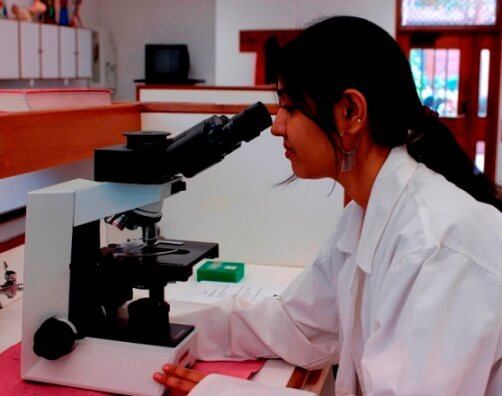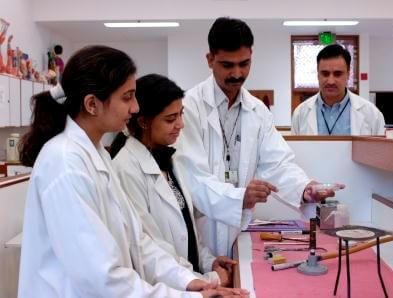
Student in AKU laboratory.
This fall, to promote the Partnership Walk in San Antonio, Dr. Shazli Malik joined Waheeda Kara, Aga Khan Foundation U.S.A. (AKF USA) volunteer, for an interview on San Antonio’s Fox News 29 station. Dr. Malik, who is originally from Pakistan, shared her personal story of how the Aga Khan Development Network makes a difference in people’s lives.
“The Aga Khan Foundation is involved in health and literacy projects in developing countries,” she told Fox News. “In my teenage years, I volunteered in one of the Aga Khan Health Services preventive health clinics for immunizations and health monitoring for young kids. And that got me interested in the field of medicine. I was fortunate enough to get admission into the Aga Khan University Medical School, which is the premiere institution in Pakistan.”
Malik lived in Karachi in the 1980s when the Aga Khan University (AKU) housed Pakistan’s newest medical school. As she considered where to apply, she looked at the two government universities and the new one. She talked with a friend who was in the first group of AKU medical students and was very impressed by the quality of instructors. “The vision of AKU was very different,” she realized. “It was a no-brainer” to apply. The competition was stiff: 1,500 applicants for just 50 slots in the first-year class.
When she was accepted, she was ecstatic.
Dr. Malik studied at AKU from 1984 through 1989, when she completed medical school, and did her internship from 1989 to 1990. She came to the United States for further study in 1991 and was struck by how an AKU education held up to international competition.

AKU Hospital students in teaching lab.
“When I graduated from medical school there,” she told the Fox interviewer, Monica Taylor, “I came to the United States to pursue my career further. And when I came here, I realized that I was on par with all of my US colleagues, because my training was really good at that institution.”
In fact, even before her residency, Malik learned that AKU students who came to England and the U.S. for rotations in their fourth or fifth years of medical school had excelled in top-tier medical programs, such as Harvard and Johns Hopkins University. Professors at West Virginia University in Morgantown were so impressed that one traveled to Pakistan to recruit more AKU students to come.
During her residency program in New York, Malik shared notes with other U.S. residents and found that the practical knowledge she had gained at AKU compared well with theirs. Now Malik has made Texas her home. “I love my job,” says Malik, who works as a pathologist with Pathology Associates of San Antonio. “I’m very settled here now.”
An AKDN education, she says, “changed my life. It was an amazing experience.” Now she is happy to give back so that others may have that chance too. She is exploring the AKF USA Deferred Giving Life Insurance Program, through which a donor can purchase an insurance policy to make a legacy gift to the foundation. And for her medical school’s 25th reunion in 2014 she will see about presenting that option to her fellow alumni as a way for them to give back as well.
“Wow! What an incredible story,” Taylor, the Fox News interviewer, said when Malik had finished.
“Absolutely,” Waheeda Kara, who is also Vice Chair for the Southwest Region Volunteer Team, agreed. “[Dr. Malik] is one of the many examples we have right here in our city,” showing how AKDN programs change lives.